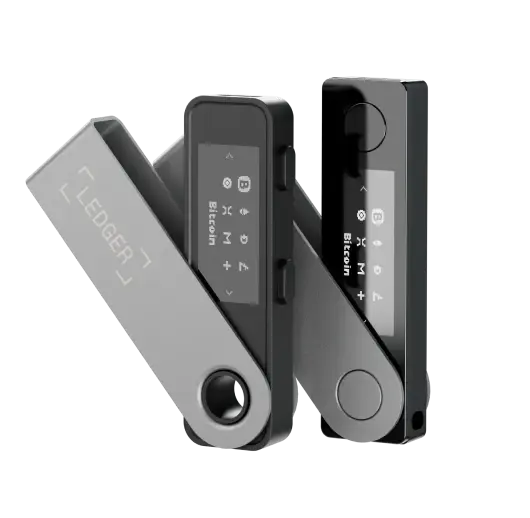Compare Ledger wallets
Get a Ledger Nano
Select and purchase a Ledger hardware wallet of your choice.
- Beginner in the crypto world? Get started with Ledger Nano S Plus.
- Prefer a Bluetooth connection? Try with Ledger Nano X.
Looking for a BNB Wallet to buy and store your BNB? Join 7+ million customers who trust Ledger hardware wallets to securely store their crypto and use them on the day-to-day basis.
Trusted by over 7 million customers

Whether you’re looking to keep your crypto safe for long-term or manage them on a daily basis, Ledger has the right product for you.
Ledger hardware wallet
Ledger hardware wallet stores your private keys and signs transactions offline, making them resistant to malicious attacks and threats. Pair the Ledger crypto wallet with Ledger Live App to manage your BNB on the go.
Ledger Live App
Ledger Live App is a gateway to manage your assets, checking your real-time balance, tracking transaction histories, and more.

Select and purchase a Ledger hardware wallet of your choice.

Download and install the Ledger Live app in a couple of clicks on desktop and mobile.
Coupled with a Ledger, it makes the most secured wallet for your BNB.

Add a BNB account with a couple of clicks. Choose among different providers and easily manage your BNB.
And not only BNB. With Ledger Live, you can manage thousands of crypto and a large variety of NFTs.

The most premium secure touchscreen hardware wallet to protect and manage your BNB.

Designed with accessible sizing, enjoy the all new secure touchscreen user experience to manage your BNB.

Our classic entry-level hardware wallets built with all the essentials to secure your BNB.

With Ledger Live coupled with a Ledger, you can:
*Buy, send/receive, swap, stake, and other crypto transaction services are provided by third-parties provider, which availability may vary based on jurisdiction/territory.

You can buy BNB with a credit/debit card or bank transfer. You can choose from a range of service providers (Paypal, Ramp, MoonPay, Sardine…) and select the option that works best for you.
Your BNB will land in your Ledger BNB Wallet.

Swapping allows you to explore different crypto assets, protect your BNB from volatility, and diversify your portfolio.
You can easily swap BNB through Ledger Live without using fiat currencies.

Binance Coin (BNB) is a digital asset used on the Binance ecosystem which includes Binance DEX, a cryptocurrency exchange and Binance Smart Chain, a blockchain to fuel various products and services. BNB was initially introduced as an ERC-20 token in June 2017 and launched through an ICO in July of that year.
Binance is a cryptocurrency trading platform that combines the words “binary” and “finance” in its name to reflect the fact that it allows for the exchange of cryptocurrencies only. It was launched in July 2017 and has rapidly become the largest cryptocurrency exchange in the world in terms of daily trading volume. In addition to being the largest exchange, Binance has also developed a number of other initiatives, including the Binance Chain, Binance Smart Chain, Binance Academy, Trust Wallet, and research projects, all of which utilize blockchain technology to drive innovation in the field of finance.
There is a fixed supply of 200 million BNB, with 50% of these being sold during the ICO, 40% being allocated to the Binance team, and the remaining 10% going to angel investors. BNB can be used to pay fees on the Binance platform, including trading fees, transaction fees, and listing fees. In order to incentivize users to purchase BNB and trade on the Binance platform, Binance has implemented this fee discount structure.
Other cryptocurrency exchanges have also released their own tokens, such as Bibox Token, OKB, and Huobi Token.
Find answers to some of the most common questions.
Related Resources